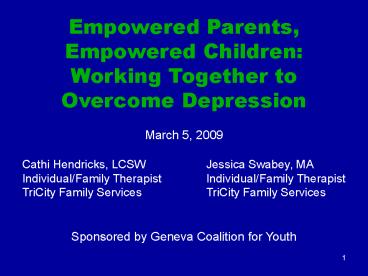Empowered Parents, Empowered Children: PowerPoint PPT Presentation
1 / 25
Title: Empowered Parents, Empowered Children:
1
Empowered Parents, Empowered Children Working
Together to Overcome Depression March 5,
2009 Cathi Hendricks, LCSW Jessica Swabey, MA
Individual/Family Therapist Individual/Family
Therapist TriCity Family Services TriCity Family
Services Sponsored by Geneva Coalition for
Youth
2
AGENDA
- Defining Depression
- Recognizing the Signs of Depression
- Understanding Interventions
- Answering Your Questions
3
DEFINING DEPRESSION
- Sadness Loss, grief, and change can lead to
periods of significant sadness which is time
limited and does not go on uninterrupted for long
intervals. - Depression When sad or negative feelings are so
intense, pervasive, and sustained that they
disrupt daily routines and activities for a
prolonged period of time.
4
Depression is a marked disturbance of mood that
persists for most of the day, nearly every day,
and lasts for at least two weeks. Question to
ask yourself To what extent do your childs
feelings and behaviors interfere with her
everyday life and normal development?
5
SIGNS OF DEPRESSION
- Watch for extreme changes in the following four
areas - Thoughts
- Emotions
- Behavior
- Body
- Depression is a cluster of symptoms, therefore
can not be diagnosed by only one symptom or sign.
6
Infants and Toddlers
- Decreased pleasure in activities
- Sad or emotionless facial expression
- Little motor activity
- Unresponsiveness or apathy / withdrawal
- Too little or too much crying
7
- Excessive whining
- Failure to grow and thrive
- Verbal expressions of sadness
- Frequent unexplained physical complaints
- Digestive Disorders
- Lack of social interest
8
Preschoolers
- Frequent, unexplained stomachaches, headaches,
fatigue - Overactivity or excessive restlessness
- Frequent sadness
- Low tolerance for frustration
9
- Persistent irritability
- Loss of pleasure in previously fun activities
- Portrays the world as sad or bleak
- Major change in eating and/or sleeping patterns
10
School-Aged Children
- Frequent and unexplained physical complaints
- Changes in eating patterns significant weight
loss or gain - Expressions of sadness or hopelessness
- Low self-esteem
11
- Frequent and excessive worrying
- Changes in sleep patterns
- Excessive tearfulness
- Decreased energy and fatigue
- Unprovoked hostility or aggression
- Refusal or reluctance to attend school
12
- Drop in school performance
- Little interest in playing with others
- Poor communication skills
- Thoughts about or efforts to run away
- Morbid or suicidal thoughts or actions
13
Adolescents
- Drop in school grades
- Behavior problems in school
- Feelings of sadness or hopelessness
- Low self-esteem
- Fatigue
14
- Changes in sleep patterns
- Loss of enjoyment in previously enjoyable
activities - Self-destructive behavior
- Difficulty in maintaining relationships
- Antisocial or delinquent behavior
- Social isolation
- Frequently feeling that nobody understands them
15
- Restlessness, grouchiness, sulkiness, excessive
moodiness - Changes in eating patterns or unintentional
weight loss or gain - Inattention to personal appearance
- Extreme sensitivity to rejection or failure
- Physical slowness or agitation
- Morbid or suicidal thoughts or actions
16
When Do I Seek Help?
- When your child expresses suicidal thoughts or
actions. - When the above symptoms impact or disrupt your
childs daily functioning and normal development.
17
IMMEDIATE INTERVENTION
- Suicidal thoughts and actions are very serious
and should always be viewed as an emergency. - Seek immediate professional help to determine
level of care.
18
INTERVENTIONS
- Seek help from a mental health professional.
- They may have you
- See your family physician or
pediatrician - Communicate with the school
- Consult a psychiatrist
- Become an active partner
- Support your child
19
See Your Family Physician
- Important to rule out any physical problems that
may mimic the signs of depression.
20
Communicate with School Staff
- To inform key staff members regarding your
childs struggles. - To access extra support.
21
Consult a Psychiatrist
- To confirm the diagnosis of depression.
- To discuss possibility of medication treatment.
22
Become an Active Partner
- Parents play an important role in the treatment
process. - Become an accurate observer.
- Ask questions.
- Respect your childs right to privacy.
- Stick to the schedule.
- Present a unified front.
- Give therapy time
23
Support Your Child
- Strategies to support your child include
- Ensure eating healthy
- Keep consistent sleep patterns
- Increase physical activity
- Stick with daily routines and schedules
24
- Develop activities that are calming and soothing
- Set realistic and achievable goals
- Respect your childs feelings
- Build communication skills
- Take care of yourself
25
ANSWERING YOUR QUESTIONS

